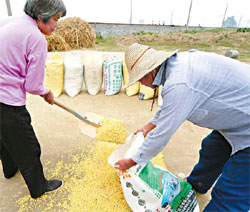Soybean industry told to enhence competitiveness
By Jiang Wei (China Daily)Updated: 2007-02-16 09:09
China's soybean industry should offset impact from increasing soybean imports by maximizing its advantages and applying international trade rules, according to industry experts.
China's soybean imports have increased tenfold in the past decade to 28.27 million tons in 2006, due to lower prices.
Industry sources, who did not wish to be named, said there were four areas Chinese farmers and the government should focus on to prevent deterioration of the soybean sector.
|
|
First, they said, farmers should improve the quality and production of soybeans by using more advanced technology.
China's average output of soybeans is about 23 percent lower than the global average, which is seen as the key disadvantage. Farmers should investigate new species and growing techniques, the sources said.
Second, Chinese farmers should cash in on the advantages of their non-genetically modified soybeans.
Genetically modified soybeans account for a large proportion of major soybean-producing countries' output, including the United States and Argentina, but this is not the case in China.
Experts urged Chinese soybean growers to develop overseas markets, such as European Union members and Japan, which encourage imports of non-genetically modified soybeans.
Third, to minimize the impact of imported soybeans, which benefit from high subsidies at home, the Chinese government could defend domestic soybean growers under the international rules of the World Trade Organization (WTO).
The government should ask developed countries to cut their agricultural subsidies in the Doha negotiations under the WTO framework to create a fair and competitive environment. China could also set up a mechanism to stop foreign agricultural products from entering the markets, the sources said.
Fourth, the government should consider the impact on agricultural products of the opening up and revaluation of the renminbi, the experts said.
The flood of soybean imports from Brazil and the United States has resulted in losses for domestic soybean growers, and also sharp decreases in soybean-growing acreage.
Northeast China's Heilongjiang Province is one of the country's major soybean-growing regions, where local farmers once described soybeans as "golden beans". But now their soybeans are selling poorly. And the largest soybean processing firm in the province has had to expand to coastal areas.
The competitiveness of home-grown soybeans was also weakened by the appreciation of the renminbi, which further undermined cost advantages.
(For more biz stories, please visit Industry Updates)
| ||
